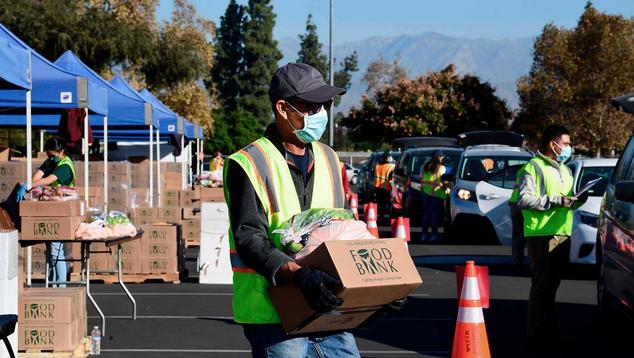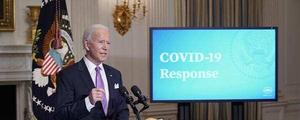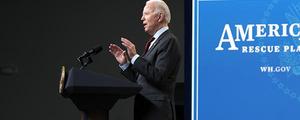Story Highlights
- Gallup Economic Confidence Index is -13, best since November
- 27% say now is a good time to find a quality job
- 40% remain worried COVID-19 will cause them severe financial disruption
WASHINGTON, D.C. -- With more than half a million deaths in the U.S. now attributed to COVID-19, the pandemic has caused a public health crisis like none other in modern history. At the same time, efforts to limit the spread of the disease have plunged the nation into an economic crisis. And though the economy has improved according to some metrics, it remains in a fragile state.
Over the past year, Gallup has tracked Americans' attitudes about many aspects of COVID-19, including their views of the U.S. economy and their personal financial situations.
Economic Confidence
In February 2020, before the coronavirus began to significantly affect the U.S., the nation's economy was experiencing its longest expansion since World War II, and the unemployment rate was a low 3.5%. However, amid statewide stay-at-home orders across the country in the latter half of March, April's unemployment rate rose sharply to 14.8%. Stores, restaurants and businesses struggled to survive, and lines for free food began to get longer nationwide. From early April to early June, between 26% and 36% of Americans believed that the nation was in an economic depression.
Gallup's Economic Confidence Index, which combines Americans' ratings of current economic conditions and their perceptions of whether the economy is getting better or worse, fell sharply from +41 in February 2020 to -33 in the latter half of April. The confidence rating has not returned to positive territory since March. Still, the most recent rating of -13 is 20 points higher than it was at its April low point.

Line graph. Gallup's Economic Confidence Index since 1996. The current -13 reading is up from -21 in January. The latest reading is also better than the -33 pandemic low from the spring of 2020.
Views of Job Market
Meanwhile, another economic measure, Americans' views of the job market, has yet to recover much ground. In April, the public's impressions of whether it was a good time to find a quality job fell 46 points to 22% as millions of workers lost their jobs. By November, that percentage had risen to 36%. But early in 2021, after the unemployment rate plateaued in December, Americans' optimism about jobs declined again, to 27%.

Line graph. Americans' views of whether it is a good time to find a quality job, from January 2020 to January 2021. The latest 27% who say it is a good time is down from 36% in November and 68% in January 2020.
Most Important Problem
Despite Americans' sharply negative ratings of economic conditions over the past year, they did not mention economic issues like the health of the economy or unemployment as the most pressing national concerns. The most recent 16% mentioning an economic issue as the most important U.S. problem is near the highest recorded since the pandemic began but is nowhere near the highest since 2001, which was 86% in 2009, during the Great Recession.

Line graph. Americans' responses to the question asking them to name what they think is the most important problem facing the country today since 2001. The latest rating for economic issues overall is 16%, which is nowhere near the previous high of 86% during the Great Recession.
In 2020, Americans were most likely to cite the coronavirus, the government or race relations as the top problems facing the country.
Worry About Experiencing Financial Hardship From COVID-19
Gallup has tracked Americans' worry about experiencing severe financial hardship as a result of the disruption from the coronavirus since April on its ongoing probability-based web panel survey. Levels of worry have fluctuated over the course of the pandemic, with highs of 53% and 54% at various points in May, July and August, but worry has been trending down in recent months. The latest polling, from February, finds 40% of U.S. adults very or somewhat worried, near the lowest measured to date.

Line graph. Percentage of Americans who are very or somewhat worried that they will experience severe financial hardship as a result of the disruption caused by the coronavirus, since April 2020. Currently, 40% are worried. The high points in the trend were 53% and 54% in May, July and August.
The pandemic has laid bare deep inequalities as some groups in society have been disproportionately affected. Specifically, lower-income Americans, who are more likely to work in service jobs that have been affected by the pandemic, have suffered the greatest economic harm.
Their level of worry is greater than for those in higher-income groups. The latest data find 57% of U.S. adults with annual household incomes under $36,000 saying they are worried they will experience severe pandemic-related financial disruption, while 43% of those with incomes between $36,000 and $89,999 and 30% of those with incomes of at least $90,000 express worry.
Assessments of Personal Financial Situation and Outlook for Future
Similarly bleak assessments from Americans with lower incomes were seen in their ratings of their financial situations in April and June, but overall, these readings showed little change compared with 2019, before the pandemic. In contrast, among U.S. adults overall, the 49% rating their financial situations as excellent or good in April marked a seven-point decline from the previous year, reflecting the impact of the coronavirus pandemic on these perceptions. But by June 2020, that percentage had rebounded a bit to 53%.
| April 2019 | April 2020 | June 2020 | |||||||||||||||||||||||||||||||||||||||||||||||||||||||||||||||||||||||||||||||||||||||||||||||||
|---|---|---|---|---|---|---|---|---|---|---|---|---|---|---|---|---|---|---|---|---|---|---|---|---|---|---|---|---|---|---|---|---|---|---|---|---|---|---|---|---|---|---|---|---|---|---|---|---|---|---|---|---|---|---|---|---|---|---|---|---|---|---|---|---|---|---|---|---|---|---|---|---|---|---|---|---|---|---|---|---|---|---|---|---|---|---|---|---|---|---|---|---|---|---|---|---|---|---|---|
| % | % | % | |||||||||||||||||||||||||||||||||||||||||||||||||||||||||||||||||||||||||||||||||||||||||||||||||
| Excellent/Good | 56 | 49 | 53 | ||||||||||||||||||||||||||||||||||||||||||||||||||||||||||||||||||||||||||||||||||||||||||||||||
| Only fair | 29 | 36 | 33 | ||||||||||||||||||||||||||||||||||||||||||||||||||||||||||||||||||||||||||||||||||||||||||||||||
| Poor | 15 | 15 | 14 | ||||||||||||||||||||||||||||||||||||||||||||||||||||||||||||||||||||||||||||||||||||||||||||||||
| Gallup | |||||||||||||||||||||||||||||||||||||||||||||||||||||||||||||||||||||||||||||||||||||||||||||||||||
These 2020 surveys also captured Americans' outlook for their own financial future. In April, half of U.S. adults said their personal finances were getting worse and 35% said they were improving. By June, pessimism had declined but was still palpable as 37% said their situations were getting worse and 41% getting better.
The data indicate that, even in the shutdown period last spring, most Americans' current financial situation was not affected enough to make them evaluate it more negatively, even as substantial proportions of Americans expressed concern that their situation was getting worse.
Anxieties about the possible trajectory in Americans' finances are also evident in another question. That question finds Americans' reports of improved personal financial situations have dropped precipitously. After hitting a record high in January 2020, the percentage of U.S. adults who say they are now financially better off than they were a year ago has tumbled 24 points to 35%, the lowest reading since 2014. At the same time, 36% say they are worse off and 28% volunteer that their situation is the same.
| January 2020 | January 2021 | ||||||||||||||||||||||||||||||||||||||||||||||||||||||||||||||||||||||||||||||||||||||||||||||||||
|---|---|---|---|---|---|---|---|---|---|---|---|---|---|---|---|---|---|---|---|---|---|---|---|---|---|---|---|---|---|---|---|---|---|---|---|---|---|---|---|---|---|---|---|---|---|---|---|---|---|---|---|---|---|---|---|---|---|---|---|---|---|---|---|---|---|---|---|---|---|---|---|---|---|---|---|---|---|---|---|---|---|---|---|---|---|---|---|---|---|---|---|---|---|---|---|---|---|---|---|
| % | % | ||||||||||||||||||||||||||||||||||||||||||||||||||||||||||||||||||||||||||||||||||||||||||||||||||
| Better off | 59 | 35 | |||||||||||||||||||||||||||||||||||||||||||||||||||||||||||||||||||||||||||||||||||||||||||||||||
| Worse off | 20 | 36 | |||||||||||||||||||||||||||||||||||||||||||||||||||||||||||||||||||||||||||||||||||||||||||||||||
| Same (vol.) | 21 | 28 | |||||||||||||||||||||||||||||||||||||||||||||||||||||||||||||||||||||||||||||||||||||||||||||||||
| (vol.) = volunteered response | |||||||||||||||||||||||||||||||||||||||||||||||||||||||||||||||||||||||||||||||||||||||||||||||||||
| GALLUP | |||||||||||||||||||||||||||||||||||||||||||||||||||||||||||||||||||||||||||||||||||||||||||||||||||
Still, they remain optimistic, as 63% expect they will be better off a year from now, while 22% say they will be worse off, a finding of net optimism for the future that is consistent with every reading since the first measurement in 1977. That is, even during tough economic times, more Americans have predicted their finances would get better rather than worse in the year ahead.
Bottom Line
The lockdowns that took place across the country last March and April helped to limit the spread of the coronavirus, but they caused a severe economic downturn. The economy roared back in the third quarter after many restrictions were eased, but in 2020 overall, it contracted rather than expanded. About one year into the pandemic, some economists think the recession it caused is over, and after a sharp drop last March, the stock market rebounded quickly and is still going strong.
With FDA approval of multiple COVID-19 vaccines secured and their administration underway, Americans think that a return to normalcy could happen sometime during the year. Yet, the economy is still in a delicate state as the unemployment rate hovers stubbornly above 6%, businesses across many sectors are in dire condition and food banks are facing persistently strong demand.




